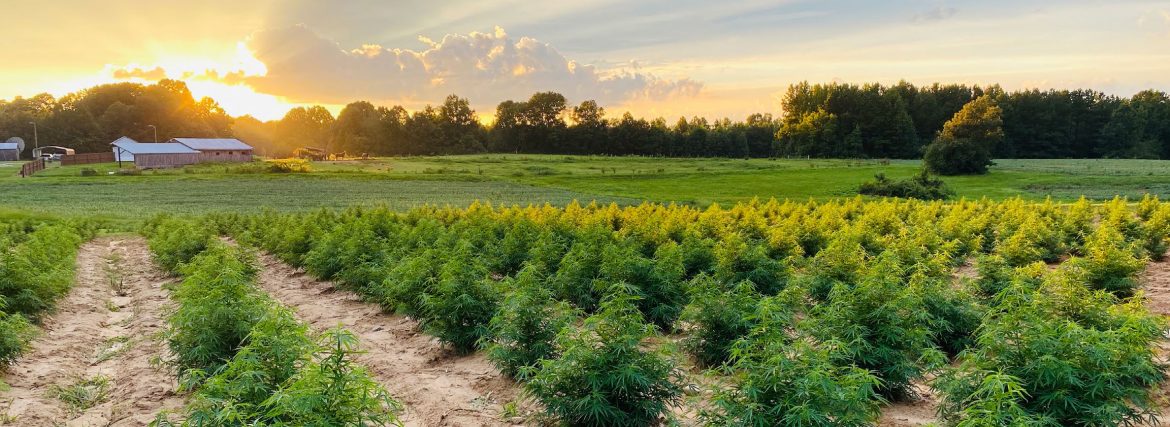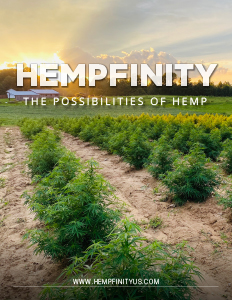Hempfinity
The possibilities of hemp
Business View Magazine interviews Patrick Brown owner of Hempfinity as part of our focus on the growing cannabis sector in America.
Patrick Brown is farming on land that his family has owned for generations in a small community called Hecks Grove in southeastern Warren County, North Carolina. “The farm was established by my great grandfather, Byron C. Brown in 1865,” Patrick recounts. “He was a first generation farmer who grew timber and raised livestock until he died in 1931. My grandfather, Grover Brown, was a second-generation farmer. He established a peach orchard in 1935, while cultivating grain and raising livestock up until his death in the 1970s. My father, Arthur A. Brown, was the third generation farmer; he continued raising livestock, and grew vegetables, grain, and tobacco up until his retirement in 2003.”

Hempfinity Founder Patrick Brown
Patrick was next in line. After graduating from Fayetteville State University in 2005, and armed with a degree in Business Administration, he travelled all over the world as a federal contractor and federal employee, working alongside the USDA and other government agencies as an Agriculture Advisor in Afghanistan, while also managing his dad’s farm. In 2014, after industrial hemp was legalized, Patrick did extensive research over the next few years before planing his first crop of germinated hemp seed in 2018. “We stopped farming tobacco and now we are focused on things that can actually heal people and the environment,” he states.
“Our mission at Brown Family Farms is to help provide an alternative, holistic solution to customers, naturally, by processing and manufacturing industrial hemp plants, natural herbs, and organic vegetables,” Patrick continues. “I have been successful in alleviating aliments with my products such as anxiety, depression, OCD, ADD, ADHD, pain, autism, mood swings, PTSD, inflammation, soreness, fatigue, acne, eczema, migraines, and psoriasis. Our products can also cure the cue-induced craving and anxiety for people who suffer from opioid addiction.” When harvested, Patrick’s hemp plants are processed at a local distillery to make products such as topicals, creams, salves, and oils. “Not only am I an operator and cultivator, I have a license to process all my products,” he notes. “So, on my farm, we are vertically integrated; we create, we process, and we distribute our products here and online.”
In a new, but still very competitive industry, Patrick maintains that the efficacy of his CBD (short for cannabidiol) products is greater than those of the competition, because of their increased levels of the specific chemical ingredients that attach themselves to the receptors in a person’s nervous system. “What we try to focus on is the differentiation between our products and everyone else’s,” he explains. “It is tied to the research and the actual size of the cannabidiol profiles that you regulate for your farm. We learned by researching the genetics of our varieties of our hemp that the cannabidiol profile for pain mitigation exceeds a larger threshold than other varieties of industrial sativa hemp. We differentiate Hempfinity by adding more cannabidiol percentages per 30 milliliters than any other products that we compete against. You have to look at the certificate of analysis to analyze the exact percentage of the cannabidiol profile in each 30-milliliter quantity, because that is the active ingredient that mitigates a particular customer’s ailment when they’re trying out the product. So, just because a product says it’s 2,500 milligrams of CBD, doesn’t make it more potent than the 1,000 milligrams of our CBD oil. Also, learning how to take the product properly is very vital, as well. So, we provide that consultation to that customer throughout their process of purchase and throughout the trial period. We also offer guarantees that the product will work for them. If not, we return their purchasing price.” While Patrick says that most of his clients are local, Hempfinity does have customers as far away as California and Ontario, Canada.
In addition to providing product for the medicinal sector, Patrick notes that industrial hemp is also an excellent, cost-effective substitute for existing products such as textiles, cellulose plastics, bio-fuels, and, now, hemcrete, which is a relatively new composite material made from the plant’s hurd, or core. Hempcrete provides a natural, vapor-permeable, airtight insulation material which also has great thermal mass, giving it a uniquely effective thermal performance. Hemp composites are light and strong, and, ideally, can even replace fiberglass and some carbon fiber.
“You have a CBD variety, and then you have your fiber varieties,” Patrick says. “We bale it up like hay and sell it per ton to large corporations. That’s the future for the industrial hemp industry; it’s the same way we’ve done with our hay over the years, and it’s the way we will be able to farm industrial hemp at a commodity level, like we do with our soybeans, tobacco, and vegetables.”
Patrick is also intent on helping other farmers, especially minority farmers like himself, learn how to utilize their land for good; planting and harvesting products that are sustainable, environmentally-friendly, and healthy for human consumption. In October 2019, he was featured as the keynote speaker for a panel called “Land of Opportunity in Black Agribusiness” at the annual Black Wall Street conference for entrepreneurs focused on the intersection of content, connections, and culture in Durham, NC. In January 2020, Patrick was featured on The Black Equity Network podcast panel “Dear Black Farmers” Episode 266.
In order to encourage young people to farm, the Brown Family Farms serves as a learning environment for organizations such as the Golden LEAF Foundation and the NC Corporative Extension offices.,. To date, 2 college interns from Winston-Salem State have volunteered over 200 hours which had helped them earn college course credits. “We’re losing a lot of younger farmers, because either they don’t have the proper educational processes to continue their farms, or they don’t have the motivation to want to continue to farm anymore. So, we allow students from various colleges and agriculture programs to come out to our farm and obtain course credits, so we can provide education and give back to the community.”
Regarding a potential move into medicinal and/or recreational cannabis, Patrick reports that North Carolina is not a state where either is legal as of yet. And even if it were, he believes that the price of entry would be prohibitive for many. “Unless you are part of a State funded social equity group large corporations such as Acreage Holdings and large pharmaceutical companies are making it hard for small farmers looking to scale up into the retail space, or to purchase their dispensary licenses. For example, in Florida, there are large pharmaceutical corporations that are buying all of the licenses, so that the mom and pop store, or the individual dispensary can’t obtain one. For someone who is looking to go for special cannabis legal compliance, once our state has gotten to that point, it’s going to be harder for them to obtain those essential licenses to not only be able to produce the product, but also to retail that product.”
“So, for us, what we have to do is look at the longevity piece of the actual brand of our company,” he adds. “I do want to focus on the medicinal space when it becomes legal in North Carolina, but we need to be able to produce products that can go into other industries like manufacturing, textiles, clothing, etc. So, I tell a lot of farmers in this space that are looking to focus on just the medicinal part and hoping that the state goes legal, to not just grow the CBD (cannabidiol) or CBG (cannabigerol) or CBN (cannabinol), but also get into growing fiber to be able to wholesale the products that are needed for the large corporations.”
So, what’s in the future for Hempfinity and the Brown Family Farms? “We would like to be the farm that continues to create,” Patrick emphasizes. “We would like to be one of the largest minority-owned farms; to be able to provide education; to be able to provide funding for food banks; to be able to provide funding and products for herbal medicines; and to be able to team with some of the largest corporations for what we do here, organically, through our various certifications to grow natural products. Our industrial hemp plants are the only plants in the world that can clothe, feed, and provide health benefits to our customers. So, not only do we want to continue to utilize our crops for those types of things on the medicinal side, but also for other industries such as manufacturing and development. Also, we want to expand the educational protocol of our farm to motivate other younger farmers. And we don’t just want to focus on Cannabis. We want to get into more specialty crops that we can add to our agricultural portfolio: specialty vegetables, herbs, holistic medicine, and things like that, so we can feed, heal and cure our community in that way.”
AT A GLANCE
WHO: Hempfinity
WHAT: A grower and distributor of industrial hemp products
WHERE: Warren County, North Carolina
WEBSITE: www.hempfinityus.com


